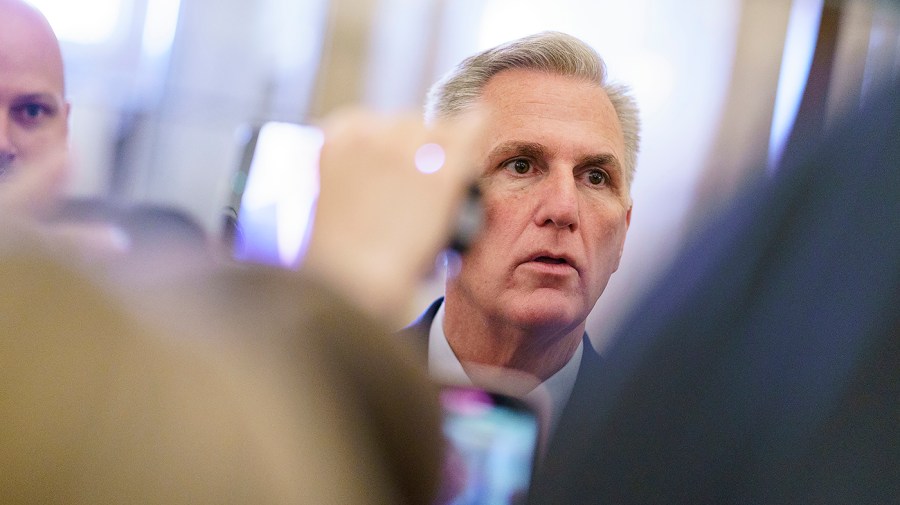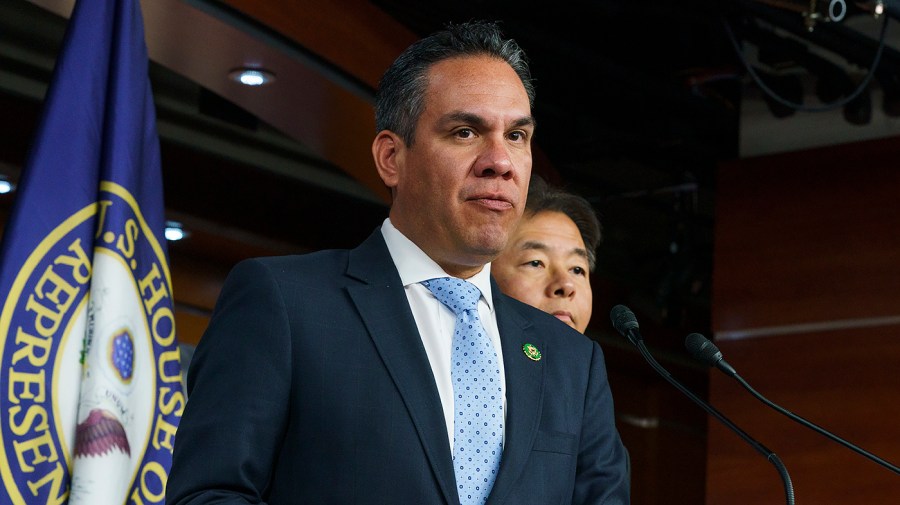McCarthy end game on debt ceiling begins to come into focus
The prevailing account says Speaker Kevin McCarthy (R-Calif.) is walking a tightrope over a shark tank in the debt ceiling talks, sidling precariously between a federal default on one side and the loss of his Speakership on the other.
The prevailing account might have it all wrong.
As McCarthy and President Biden race to find common ground on extending the government’s borrowing authority, the Speaker has defied the doubts that came with his arduous path to the gavel, building up trust among his conservative naysayers and creating what appears to be a comfortable space to battle Biden over the terms of the debt ceiling hike.
McCarthy has dragged Biden to the negotiating table, which the president resisted for months. He’s taken any tax hikes — which Democrats have demanded in past debt limit fights — off the table. And the Speaker’s success last month in shepherding a Republican debt-ceiling package through the House — despite a tiny GOP majority — has buoyed even some of his fiercest conservative detractors.

Speaker Kevin McCarthy (R-Calif.) addresses reporters after he returns from a closed-door House Republican Conference meeting at the Capitol Hill Club in Washington, D.C., on Tuesday, May 23, 2023. (Greg Nash)
Those conservatives say they’re not eyeing an effort to strip McCarthy of his gavel, even if they oppose an eventual compromise with Biden.
“Nobody’s talking about that,” Rep. Bob Good (R-Va.) recently told MSNBC. “We support our Speaker. We want him to be successful because the country needs for him to be successful.”
“Literally nobody except the press is talking about removing McCarthy right now,” Rep. Matt Gaetz (R-Fla.) echoed Monday on Twitter.
Those dynamics could set the stage for a compromise that looks a lot like the debt ceiling deals of years past, when liberals rejected the legislation for cutting too much spending, conservatives opposed it for not cutting enough — and some motley combination of moderates and leadership allies in both parties came together to approve the bill and prevent a default.
“The mechanics of getting there we’re very in tuned with,” said Rep. Patrick McHenry (R-N.C.), one of the Republicans leading the talks with the White House.
More coverage of the debt ceiling from The Hill:
- White House: 14th Amendment won’t solve current debt ceiling standoff
- Higher education braces for the worst in debt ceiling fight
- GOP skepticism grows over Yellen’s June 1 debt ceiling deadline
- House Republicans cancel markups for spending bills amid debt ceiling talks
McCarthy is not blind to those dynamics, acknowledging Monday that House Republicans were never going to get everything they wanted, given the Democrats’ control of the White House and Senate — the same divided powers that governed similar debt ceiling battles between former President Obama and then-Speaker John Boehner (R-Ohio), and more recently between former President Trump and then-Speaker Nancy Pelosi (D-Calif.).
“It happens every single time,” McCarthy told reporters in the Capitol shortly before a meeting with Biden at the White House. “That’s what divided government does.”
Yet McCarthy’s challenge is not merely in negotiating a bipartisan compromise, it’s also in putting a bill on the House floor that can win Biden’s support without angering conservatives to such an extent that they seek to boot the Speaker from power.
“The skepticism of McCarthy specifically has been hanging in the air for a long time now, and sort of is a dark cloud over the proceedings this time around,” said Philip Wallach, senior fellow at the American Enterprise Institute.
“It’s easy to imagine that dissipating, and Kevin McCarthy showing that once again, the doubters are going to realize that he’s capable of more than they imagined,” he continued. “But it’s also just as easy to imagine things becoming very tricky if Republicans start really tearing each other to pieces.”

House Speaker Kevin McCarthy of Calif., speaks as he meets with President Joe Biden to discuss the debt limit in the Oval Office of the White House, Monday, May 22, 2023, in Washington. (AP Photo/Alex Brandon)
McCarthy has dismissed the idea of an internal GOP revolt, predicting he can negotiate a deal that both avoids a default and wins at least half of his conservative-heavy conference — a stipulation known informally as the Hastert Rule.
“I firmly believe what we’re negotiating right now a majority of Republicans will see that it … [will] put us on the right path,” he said Monday.
Still, the removal process was made easier by the rule changes McCarthy agreed to in January as a condition of gaining enough conservative support to win the gavel — changes that allow a single lawmaker to launch the process of vacating the Speaker’s chair. And Democrats aren’t so sure McCarthy would stage a vote on a bipartisan debt ceiling bill if his seat is on the line.
“That’s the big unknown,” said Rep. John B. Larson (D-Conn.), a 25-year veteran of Capitol Hill, noting that the threat to vacate the Speakership is more explicit this year than in those of the past. “Were that not the case, were that Paul Ryan or John Boehner, you would be able to say, ‘OK, I can pretty much figure out how that will play [out].’ But this is an unknown that we haven’t had before.”
Rep. Pete Aguilar (Calif.), chairman of the House Democratic Caucus, was even more skeptical.
“If Kevin McCarthy is forced to choose between holding power in his Speakership, or taking us closer to default, we know he’s going to choose default,” Aguilar told reporters earlier in the month.
Still, Democratic leaders will have their own challenges in the debate, since any compromise will necessarily feature some of the spending cuts and other policy changes Republicans are demanding.
Indeed, Biden has already signaled an openness to a spending freeze for 2024, permitting reforms to expedite energy projects and an expansion of work requirements for some social benefit programs. All of those provisions are opposed by liberals in Congress, and their inclusion will test the ability of House Minority Leader Hakeem Jeffries (D-N.Y.), the newly installed Democratic leader, to rally his members in support of their White House ally.

Rep. Pete Aguilar (D-Calif.) speaks to reporters alongside Rep. Ted Lieu (D-Calif.) following a House Democratic Caucus meeting on Wednesday, May 10, 2023.
Democratic support will be crucial to the bill’s success, because a number of conservatives say they won’t vote for anything less than the House GOP bill. And Democrats are already warning that their support will have limits, too.
“Let’s face it, the majority of votes to pass this in the House is going to come from the Democratic side. So we can’t have a deal that is so weighted toward Republican priorities on policy, and yet when it comes to the votes, it’s the House Democrats who are expected to do the heavy lifting,” Rep. Brendan Boyle (Pa.), senior Democrat on the House Budget Committee, told CNN on Sunday night.
“That, frankly, is just not going to happen.”
McCarthy’s conservative detractors have given the Speaker high marks throughout the debate while putting pressure on him to hold his ground. But even so, “I haven’t heard anybody talking about motion to vacate except for reporters who asked me about that,” Good told The Hill.
Additionally, any conservative effort to topple McCarthy would necessarily require the support of virtually all of the minority Democrats, since the Speaker would likely be backed by the overwhelming majority of his GOP conference — a step many Democrats say they simply wouldn’t take.
“I don’t think there is interest on the part of Democrats to fuel the uncertainty and the chaos,” said Rep. Earl Blumenauer (D-Ore.). “That doesn’t help any of us.”
Emily Brooks contributed. Updated at 1:38 p.m.
Copyright 2023 Nexstar Media Inc. All rights reserved. This material may not be published, broadcast, rewritten, or redistributed. Regular the hill posts







